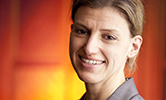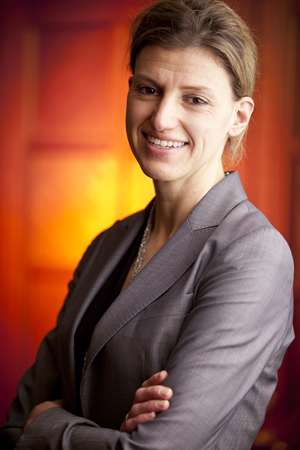
Real growth, real learning: Camilla Sutton
Camilla Sutton (BA (IDS)’93) is currently working at Scotiabank, Global Banking and Markets as Chief Currency Strategist. Like many other Dalhousie students, Camilla is originally from Toronto, but came to Dal to branch out and try something new.
Why Dal?
Camilla began studying IDS out of a natural interest for the subject. She wanted to learn more about global economies and development. At the time Camilla attended Dal, exchange programs weren’t a common option. She admits she would have loved to study abroad, believing that international travel is a great asset to the International Development Studies (IDS) program.
Camilla lived in an all French campus house in her first year. There, she and five other students lived and spoke French in order to gain a better understanding of the language. The friendships she made at Dal have been lifelong. Camilla believes that it is the way the professors approach education and teaching that makes Dalhousie such a fabulous school, and the location can’t be beat. “Halifax is a wonderful city, and the campus is beautiful,” she says.
What do Liberal Arts degrees offer students?
Camilla truly believes in the value of an arts degree, explaining that students receive a broad knowledge base that includes writing, analysis and communicating ideas. These types of skills open many doors and can transfer to any career.
After completing her BA at Dalhousie, Camilla went on to an MBA at the Ivey School of Business. She uses this combined background – arts and business – in her career today.
What are some of your professional highlights (to date)?
“Every step has had its own highlight. In my current role, I have the pleasure of meeting people across the world who are impacted by currencies. This includes visits to central banks, corporate Canada and global asset managers. Each interaction has its own highlight. One of the pleasures of visiting the east coast of Canada (beyond the sheer beauty of the land) is meeting with some of the corporations that have powerful business models, understanding how foreign exchange impacts them and then trying to communicate the foreign exchange risks they face and how to mitigate it,” she says.
She says her IDS degree has helped her in her role, and the training is applicable for people working in a wide range of fields.
“People who can think globally and act locally can add significant value. One of the things that I think is particularly valuable about IDS is that it teaches one to think from a host of perspectives. Projects would fail if thought of only from the perspective of advanced economies and vice versa; these skills prove invaluable in all career paths,” she says.
What advice do you have for the next generation of FASS graduates?
“Don’t worry about finding your career path right away,” Camilla says. “This is an extraordinary time in your life, full of adventure, growth and challenges. Don’t rush your path, as sometimes the windy one is full of enjoyable surprises.”
She says the classes she took and her experiences in her undergrad have helped her in her life, even if it they weren’t directly related to her career. “You can always change your course and take the skills you have already gained and apply them to something new,” she says.
Camilla is an exceptional example of how an arts foundation gives a person the skills they need to continue their education and use their knowledge to be extremely successful in their career.
